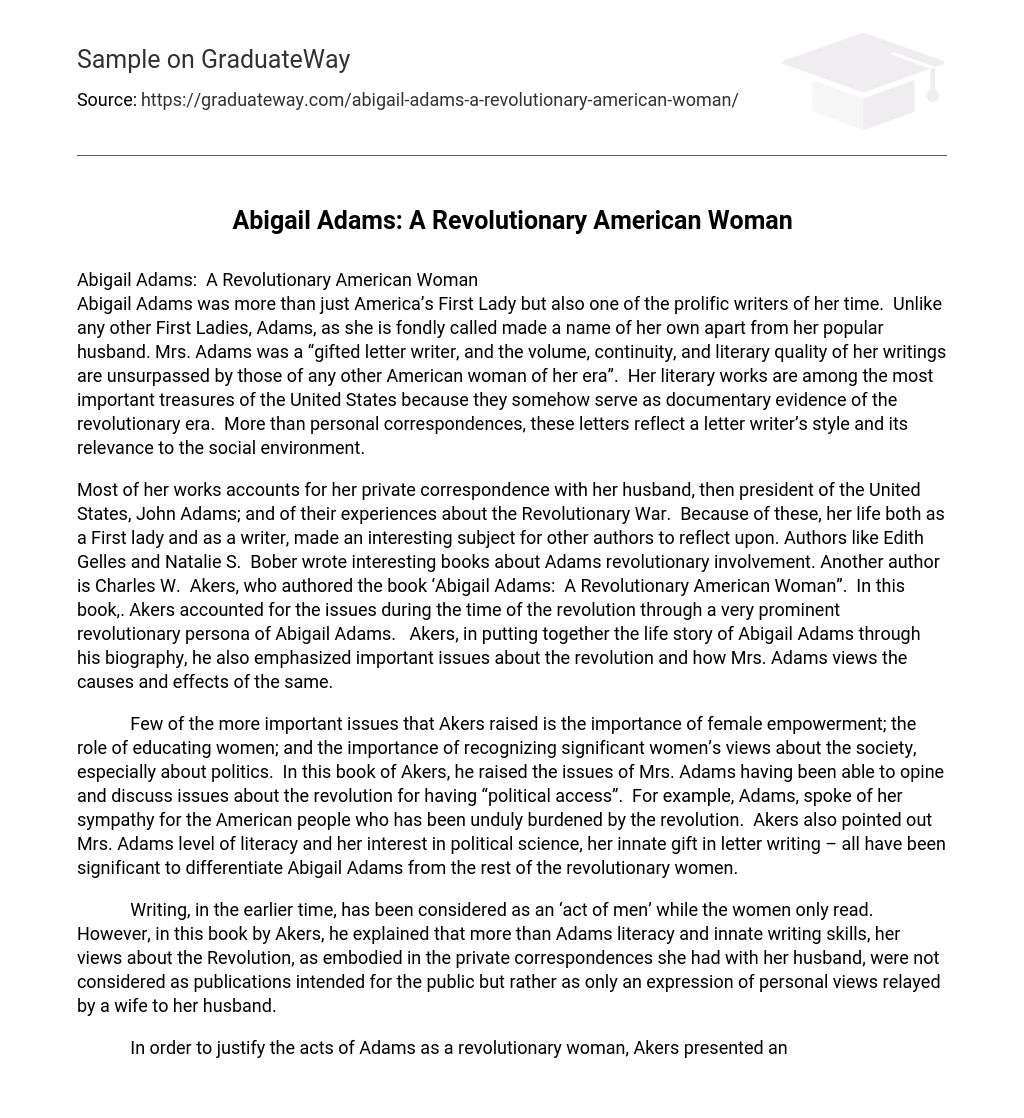Abigail Adams was more than just America’s First Lady but also one of the prolific writers of her time. Unlike any other First Ladies, Adams, as she is fondly called made a name of her own apart from her popular husband. Mrs. Adams was a “gifted letter writer, and the volume, continuity, and literary quality of her writings are unsurpassed by those of any other American woman of her era”. Her literary works are among the most important treasures of the United States because they somehow serve as documentary evidence of the revolutionary era. More than personal correspondences, these letters reflect a letter writer’s style and its relevance to the social environment.
Most of her works accounts for her private correspondence with her husband, then president of the United States, John Adams; and of their experiences about the Revolutionary War. Because of these, her life, both as a First lady and as a writer, made an interesting subject for other authors to reflect upon. Authors like Edith Gelles and Natalie S. Bober wrote interesting books about Adams, revolutionary involvement. Another author is Charles W. Akers, who authored the book ‘Abigail Adams: A Revolutionary American Woman”. In this book,. Akers accounted for the issues during the time of the revolution through a very prominent revolutionary persona of Abigail Adams. Akers, in putting together the life story of Abigail Adams through his biography, he also emphasized important issues about the revolution and how Mrs. Adams views the causes and effects of the same.
Few of the more important issues that Akers raised is the importance of female empowerment; the role of educating women; and the importance of recognizing significant women’s views about the society, especially about politics. In this book of Akers, he raised the issues of Mrs. Adams having been able to opine and discuss issues about the revolution for having “political access”. For example, Adams, spoke of her sympathy for the American people who has been unduly burdened by the revolution. Akers also pointed out Mrs. Adams level of literacy and her interest in political science, her innate gift letter writing – all have been significant to differentiate Abigail Adams from the rest of the revolutionary women.
Writing, in the earlier time, has been considered as an ‘act of men’ while the women only read. However, in this book by Akers, he explained that more than Adams literacy and innate writing skills, her views about the Revolution, as embodied in the private correspondences she had with her husband, were not considered as publications intended for the public but rather as only an expression of personal views relayed by a wife to her husband.
In order to justify the acts of Adams as a revolutionary woman, Akers presented and pointed out some very important correspondences between Adams and her husband. As a biography, Akers, in this book, we’re able to present vivid evidence of Mrs. Adams involvement in the Revolution. Her letters contained views about the roots of the revolution that somehow became a vehicle for a woman to at least indirectly opine about the Revolution. It revalidates that Abigail Adams, despite the fact that “distrust of the female capacity to take politics seriously” was able to use of her political access to participate and express political insights, her sentiments and feelings about the revolution.
In the book, there are also other issues that Akers raised in connection with gender roles and women in the American society. It has always been said that women during the early American times, has always been discriminated, to the point that their social and political involvement has likewise been limited and curtailed. Although there may have been enough opportunity and instances by which to incorporate discussions and views about these topics, Akers only discussed the issues consequent to Abigail’s role in emphasizing them. For example, instead of discussing in isolation the issue of woman empowerment, he discussed it in connection with Adams. Akers is correct in deferring not to give comprehensive discussions about these matters as the book was intended to focus on the life of Abigail Adams especially during the revolutionary time, not only as a woman; wife to an American president; but also as an American citizen with her own views and opinions about her political environment.
As it appears, Akers has shown some biases by concentrating on the life and views of Abigail Adams regarding the Revolution. However, this has been an effective technique as the book is in fact about Abigail Adams. These biases even brought out the reasons why Abigail Adams is not just an ordinary woman.
In sum, the book has more to offer than the life of Abigail Adams. Initially set as a biography, the book also discussed important political issues and social prejudices especially against the women. It sets out the fact that Abigail Adams is indeed a revolutionary woman because she, despite the restraints against women, she was able to stand up not only for herself but for the rest of the women. This Akers work, rich in historical perspectives, can be recommended for those with an intense interest about the revolution, Abigail Adams, John Adams, women, and the American societal history.





